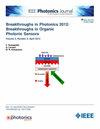Design and Demonstration of MOCVD-Grown p-Type AlxGa1-xN/GaN Quantum Well Infrared Photodetector
IF 2.1
4区 工程技术
Q3 ENGINEERING, ELECTRICAL & ELECTRONIC
引用次数: 0
Abstract
Quantum well infrared photodetectors (QWIPs) have been demonstrated to be a suitable candidate for IR detection applications. These detectors attracted increasing interest due to their design flexibility and broad spectral absorption from short wave (SWIR) to long wave infrared (LWIR) and high uniformity. In this paper, we demonstrate device design, growth, and characterization of a设计和演示 MOCVD 生长的 p 型 AlxGa1-xN/GaN 量子阱红外光探测器
量子阱红外光探测器(QWIPs)已被证明是红外探测应用的合适候选器件。这些探测器因其设计灵活、从短波红外(SWIR)到长波红外(LWIR)的宽光谱吸收和高均匀性而吸引了越来越多的关注。在本文中,我们展示了通过金属有机化学气相沉积(MOCVD)技术生长的对型 AlxGa1-xN/GaN 量子阱红外光探测器(QWIP)的器件设计、生长和特性分析,该器件具有 1.55 μm 峰值的近红外吸收特性。利用 p-QWIP 可以实现正常入射光吸收,因为在 k ≠ 0 时,重孔和轻孔之间具有很强的带混合,这就不需要光栅等光耦合器,也有利于制造大型焦平面阵列(FPA)。我们开发了 MOCVD 生长条件,以在 QWIP 中实现纳米厚的平滑界面。包括原子力显微镜 (AFM) 在内的样品表征显示出均匀的表面形貌,粗糙度均方根 RMS ∼0.5 nm。扫描透射电子显微镜(STEM)用于表征层厚度和界面粗糙度。我们演示了 AlxGa1-xN/GaN p-QWIP 的能带图模拟,通过考虑极化充电器来确定准确的带偏移和调整吸收波长(ISBT 能量)。我们的研究结果表明了 MOCVD 生长的 p 型 AlxGa1-xN/GaN QWIP 用于红外吸收的可行性,并为进一步研究和开发 III 氮化物 p-QWIP 的生长开辟了道路,使大型焦平面阵列的生长和制造成为可能。
本文章由计算机程序翻译,如有差异,请以英文原文为准。
求助全文
约1分钟内获得全文
求助全文
来源期刊

IEEE Photonics Journal
ENGINEERING, ELECTRICAL & ELECTRONIC-OPTICS
CiteScore
4.50
自引率
8.30%
发文量
489
审稿时长
1.4 months
期刊介绍:
Breakthroughs in the generation of light and in its control and utilization have given rise to the field of Photonics, a rapidly expanding area of science and technology with major technological and economic impact. Photonics integrates quantum electronics and optics to accelerate progress in the generation of novel photon sources and in their utilization in emerging applications at the micro and nano scales spanning from the far-infrared/THz to the x-ray region of the electromagnetic spectrum. IEEE Photonics Journal is an online-only journal dedicated to the rapid disclosure of top-quality peer-reviewed research at the forefront of all areas of photonics. Contributions addressing issues ranging from fundamental understanding to emerging technologies and applications are within the scope of the Journal. The Journal includes topics in: Photon sources from far infrared to X-rays, Photonics materials and engineered photonic structures, Integrated optics and optoelectronic, Ultrafast, attosecond, high field and short wavelength photonics, Biophotonics, including DNA photonics, Nanophotonics, Magnetophotonics, Fundamentals of light propagation and interaction; nonlinear effects, Optical data storage, Fiber optics and optical communications devices, systems, and technologies, Micro Opto Electro Mechanical Systems (MOEMS), Microwave photonics, Optical Sensors.
 求助内容:
求助内容: 应助结果提醒方式:
应助结果提醒方式:


